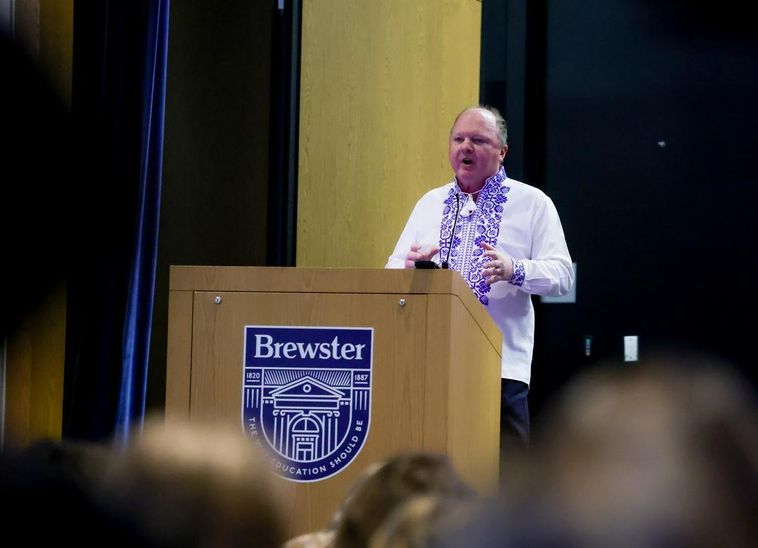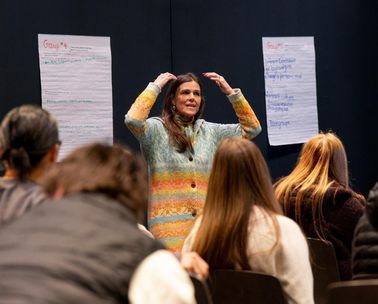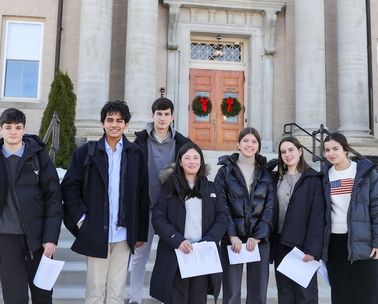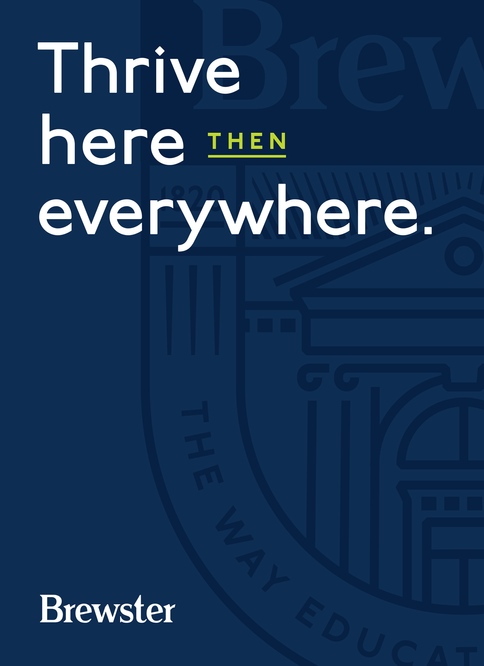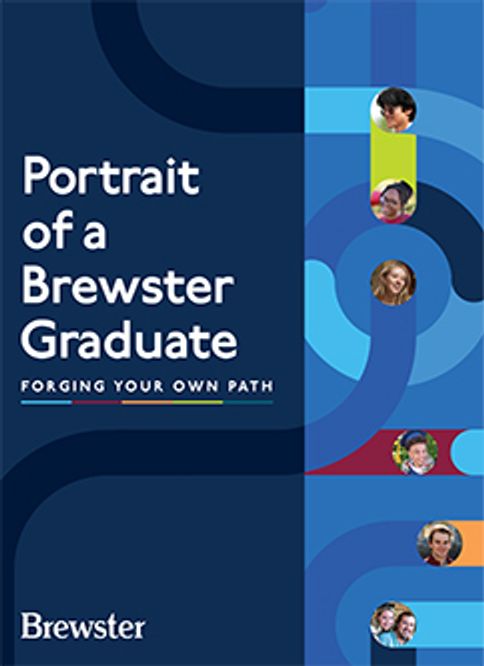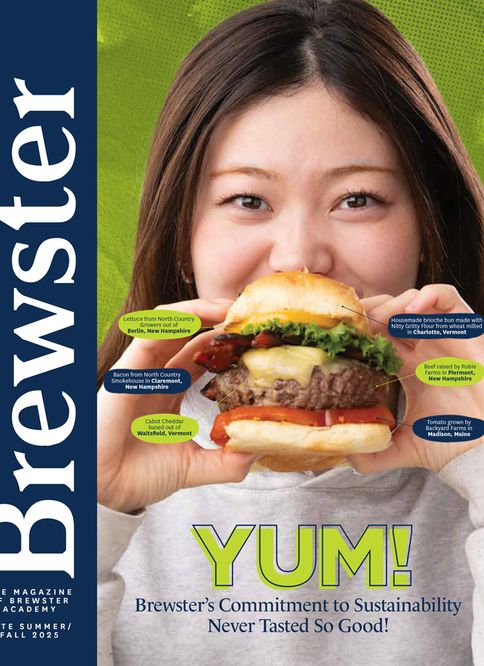

Ready, Set, Solve!
Brewster offers the full spectrum of college preparatory mathematics courses, ranging from Algebra 1 to Advanced Placement Calculus BC. Small class sizes, best teaching practices, and group work create a highly effective learning environment in which teachers can meet the individual needs of students and help them grow their confidence, mathematical knowledge, and skills.
"When a student realizes a concept can be found in their everyday world, that inspires me to keep doing what I'm doing— to keep showing kids that math can be fun."

Finding Angles in the Real World
Students in Mr. Moore’s Geometry class don’t just decipher angles inside the classroom. They get outside, map steps around campus, and put their newfound knowledge of angles to use as they build out campus measurements obtained from their data.
Mathematics Courses
Geometry
This course explores the concepts of point, line, plane, distance, angle, surface, and curve, and how we can model our physical world. Students build language and reasoning skills through comparisons of lines and planes, circles and spheres, areas and volumes. Applications to real-life situations emphasize connections between geometric ideas and provide students with a background to practice and demonstrate the variety of geometric skills and visualizations developed in the course. Successful completion of this course prepares for an Algebra course suited to their experience.
Algebra 1
This course explores number systems, arithmetic operations, common representations, and the patterns variables follow in algebraic operations. Students build understanding of algebraic expressions, solving and graphing linear equations, solving, graphing and interpreting systems of equations, and operations with polynomial expressions. Students are introduced to representations of quadratic equations, and students practice multiple methods for solving quadratic equations and develop visual skills through graphing quadratic, polynomial, and inverse functions. Successful completion of this course prepares students for Algebra 2.
Algebra 2
This course continues the study of algebraic functions and processes from Algebra 1, with a detailed treatment of quadratic, polynomial, and rational functions. A combined graphical and analytic approach to these functions identifies characteristics, like minima and maxima, and patterns, like end behavior. Solving equations with quadratic, polynomial and rational functions explores the real and imaginary number systems. Students complete an introductory study of exponential and logarithmic functions, with applications to interest, depreciation, and natural models of population growth and decay. Successful completion of this course prepares students for Statistics and Precalculus.
Functions, Statistics, and Trigonometry
This course reinforces the analysis of the major function families introduced in the Algebra sequence. Additionally, this course introduces trigonometric functions, probability and descriptive statistics. Lessons and assessments in this course are infused with lab activities and projects that foster a hands-on, data-based approach to understanding key mathematical concepts. Students regularly use technology, databases, and online applications to facilitate their understanding of topics presented within the course. Successful completion of this course prepares students for Statistics or Precalculus.
Statistics
This course introduces major themes of data science and data representations applicable to most college majors. Students explore topics in descriptive statistics, sampling and experiment design, probability, discrete and continuous random variables, and the normal distribution. Students apply statistical analysis to inference procedures, including sampling distributions, confidence intervals and hypothesis tests for single random variables. Successful completion of this course prepares students for AP Statistics.
Pre-Calculus
This course develops understanding of the patterns of algebraic functions, introduces trigonometric functions, and builds the foundation of mathematical analysis required in the study of calculus. Students explore the characteristics of polynomial, rational, exponential and logarithmic functions, including domain, range, intervals of increase and decrease, zeros, inverses of functions, asymptotes, and end behavior, using graphs and analysis. Students complete a thorough study of trigonometry including evaluation of expressions, graphing functions, demonstrating identities, and solving trigonometric equations. With the toolkit of elementary and transcendental functions, students examine rates of change and investigate limits in preparation for the study of calculus. Successful completion of this course prepares students to take a Calculus or a Statistics course suited to their experience and goals.
Topics in Calculus
This course exposes students to a comprehensive list of calculus topics, at a moderate pace, with emphasis on project-based learning. Topics include limits, derivatives, applications of derivatives for optimization and related rates, integration, and applications of integrals for calculations of area and volume. Applied problems are drawn from the broad range of the natural sciences, engineering, and technology. Successful completion of this course prepares students for AP Calculus AB or a Statistics course suited to their experience and goals.
Computer Programming
This course introduces students to key computing concepts and programming skills applicable to all computer programming languages. Students will build skills for iOS application development with the language Swift and through Swift Playgrounds. Students will develop practical experience with the structures of apps including maps, tables, games, navigation, photos, and camera. Throughout the course, students will have the opportunity to modify existing programs and develop unique designs for implementation. The course follows the general outline of AP Computer Science Principles and uses resources recommended by the College Board.
Computer Science
This course develops the fundamental programming skills from the Computer Programming course. Students will grow their skills with computer programming by analyzing, writing and testing code using variables, control structures, polymorphism, and object-oriented design. Java is the fundamental programming language for this course where students work both individually and collaboratively to expand their flexibility and focus to meet programming objectives.
Advanced Placement Statistics
This course develops the four themes of statistical science, Descriptive Statistics, Sampling and Experimentation, Probability, and Inferential Statistics, at a rigorous pace and depth that is aligned with the College Board AP Statistics curriculum. Problem solving, analysis, pattern recognition, interpretation, and critical thinking are central skills developed through this course. Students will explore data technologies, using graphing calculators in daily class activities, and learn to operate data software and interpret a variety of common data outputs. Successful completion of this course prepares students for the AP Statistics exam in May, with the potential to earn college credit for Statistics I. Enrollment requires a summer assignment, a teacher recommendation, and completion of Precalculus or Statistics.
Advanced Placement Calculus AB
This course encompasses a rigorous study of differential and integral calculus that is aligned with the College Board Advanced Placement Calculus AB curriculum. Students explore key concepts such as limits, derivatives, and integrals, applying them to linearization, optimization, related rates, and motion analysis. Additional topics include Riemann sums, integration techniques, and applications to area and volume. Applied problems are drawn from the broad range of the natural sciences, engineering, and technology. Successful completion of this course prepares students for the AP Calculus AB exam in May, with the potential to earn college credit for Calculus I. Enrollment requires a summer assignment, a placement test, and teacher recommendation.
Advanced Placement Calculus BC
This course develops the concepts of differential and integral calculus, studied in Calculus AB, while introducing students to parametric, polar, and vector functions, formal limit definitions and integrals, approximations, and series analysis. Students work extensively with advanced integration techniques, their applications, summation notation, improper integrals with strong emphasis on convergent and divergent series. Applied problems are drawn from the broad range of the natural sciences, engineering, and technology. Successful completion of this course prepares students for the AP Calculus BC exam in May, with the potential to earn college credit for Calculus II. Enrollment requires a placement test and teacher recommendation.

